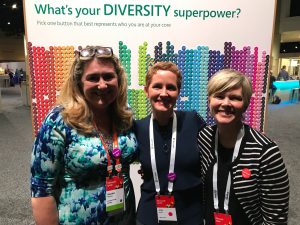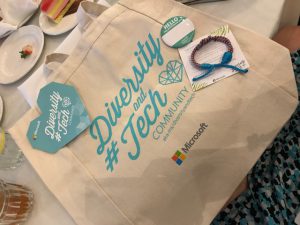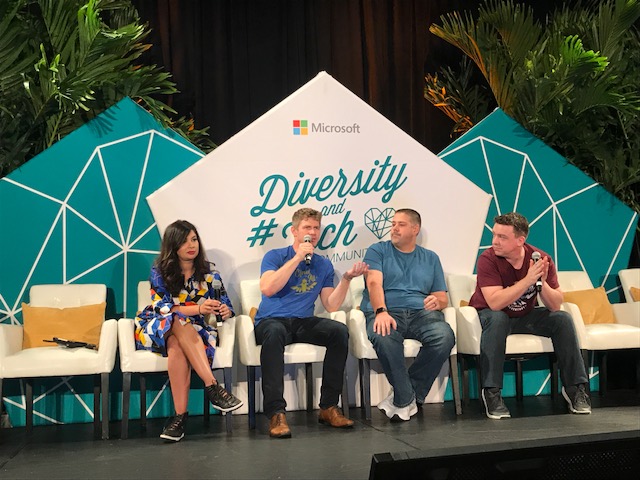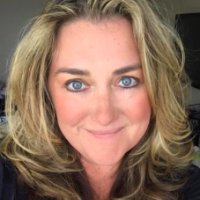Ignite Series: IT Girl
This article is written by MVP Heather Newman on her experiences at this year's Microsoft Ignite Event.
In being asked to write about my Microsoft Ignite Experience this year, I thought a lot about what I took away from the event as a Microsoft MVP - my contribution was speaking, podcasting and meet-up hosting in the Diversity and Tech track and program. 
I'm extremely proud of the team that produced all of Microsoft Ignite, and all of our flagship events as I worked closely with them and program lead Shona Chee and Cindi Newell-Timmons, Michelle Devereaux and the Nteractive team on the Diversity and Tech program.
The numbers were excellent. Daily power lunches, over 35 sessions, numerous podcasts, meet-ups and a lounge with an Idea Swap area, student ambassadors, thoughtful swag, executive presence and support, discussions, new codes of conduct and the #diversityandtech hashtag going large on social media - to me Diversity and Tech was the buzz of the event. I may be biased, but regardless the attention was palpable. To watch on-demand sessions from the event - check them out here.
Technology leads so much of our lives and more so these days in the lands of Cortana, Siri and Alexa, AI, IoT and bots and our smartphones cemented into our hands. Diversity, Inclusion, Intersectionality, and Belonging (DIIBS) has traditionally lagged in high tech. But these topics lag in many sectors, if not all of them. Global movements, political landscapes, and internal memos have forced the hand or more so forced the thinking and policies around these subjects.
Microsoft and IBM, for example, have always had diversity programs and are leaders in how they treat employees, partners, and customers. Many others have not or do not. Diversity and inclusion programs are only as good as how the leaders and managers inside companies act, uphold and truly embody not only what those programs mean, but how they treat the people that they directly manage. One of the most popular sessions in the Microsoft Ignite Diversity and Tech program was by Microsoft Cloud Advocate, Sonia Cuff on Dealing With and Managing Burnout. Wellness and mental health are a big part of everyone's everyday life and working in technology is fast-paced, ever-changing and demanding. Burnout is something we all need to keep our eyes on, talk about and take steps towards finding work/life balance.
I've worked in some capacity in diversity and women's issues for over a decade, and the fact that the technology industry as a whole is jumping on the diversity bandwagon is a step in the right direction. And the shift from "Women in X" to “Diversity in X” in all its various shapes, sizes and forms is also a leveling up of the conversation that is timely and more inclusive and does include white men. Some people argue this notion with me but building male allies is so important and inclusion, means inclusion. If you aren’t included, you aren’t part of the conversation, so you cannot apply learning and take action. The patriarchy has been alive and well for thousands of years, it will take all of us to move deeper towards equality for all. Diversity isn’t only about gender its about all the beautiful things we all are.
Someone asked me recently about what I thought about this new wave of thinking around diversity, and I said a little sarcastically she is our "it girl" of the day. An "It girl" is an attractive young woman, generally a celebrity, who is perceived to have both sex appeal and a personality that is especially engaging. The expression “it girl” originated in British upper-class society around the turn of the 20th century. The expression reached global attention in 1927, with the popularity of the Paramount Studio film IT, starring Clara Bow.
In the earlier usage, a woman was especially perceived as an “it girl” if she had achieved a high level of popularity without flaunting her sexuality. Today the term is used more to apply simply to fame and beauty. And it had a lot to do with being in the right place at the right time and being "discovered" by someone else who deemed you that moniker. Vanity Fair has one of its covers yearly dedicated to the "it girl" of the year. It is a turn of phrase that isn't used as much anymore as the term girl referring to women can be demeaning in context.
 My reference to was cheeky for sure, however:
My reference to was cheeky for sure, however:
Is diversity the new "it girl" of high popularity in our world?
Is it the new bandwagon that everyone is jumping on to be a part of?
If so, I say WHY NOT, GOOD and welcome to the party, everyone is invited.
Here’s the thing: I want more people on this bandwagon, I want gaggles of men to come to the Diversity and Tech booth and to ask for an aqua t-shirt, not to give to their wives but for them to wear (I saw this and loved it). I want managers to treat their employees with respect and kindness and truly live the doctrines that are being put in place in so many companies in our industry. I want more conversations and truth-telling and talking about the hard stuff so that we can understand each other's experiences in an empathetic way. I want a lot of things, pink ponies aside, but I believe that we are capable as humans of anything. Nelson Mandela said, "if they can be taught to hate, they can be taught to love." Hate is a strong word, but to me it equals fear, and fear leads us to do and say things that hurt ourselves and others with the smallest of cuts and the deepest of wounds. 
I saw the bursting open of this dialogue at Microsoft Ignite, and it was awesome. I saw it everywhere I looked. People taking selfies with their diversity bracelets and superpower buttons held high. Thoughts of diversity came up in almost every conversation I had. My phone and email blew up after my session on fear and toxicity and most of the rest of my time at the event was listening to people share their stories, ask how can I help, how do I deal with X and how can I get involved more.
As more people in technology and the world at large are discovering, uncovering, learning about diversity and what it truly means, I also see people looking inward. Delving into their experiences of how they grew up, the things that happened to them, what they were taught, heard and were a part of at one time that may not align with how things are shifting today, and that is phenomenal. That is how we evolve, that is how we heal, and that is how we become the best versions of ourselves.
I am excited for the future of our industry, how we present ourselves in our conferences, meetings, and water cooler discussions. And am always grateful to work in and around a company like Microsoft with people inside it that have both the backbone, forethought, and moxie to weave diversity, inclusion, intersectionality, and belonging into its DNA and not just bolting these issues onto how they run their businesses.
So maybe "it girl" is another term that is something to be retired. The "It person" is where it's at.
I am thankful to have watched and been involved in another moment where our Microsoft community pushed forward together during one of our largest conferences, Microsoft Ignite.
So tag, you are it! So let's do this, let’s continue to move the needle forward, together.
Because we are better when we are together, humans in tech empowering everyone along the way.
 Heather Newman is a Microsoft MVP for Office Apps and Services. She is a technology entrepreneur and award-winning senior marketing professional that thrives in both startups and established corporations. She is the Chief Evangelist and CMO of Content Panda, a high tech business dedicated to creating products that deliver a superior user experience that drive value to businesses. Heather lives in California and enjoys traveling the world speaking about SharePoint and Diversity in Technology. Follow her on Twitter @heddanewman.
Heather Newman is a Microsoft MVP for Office Apps and Services. She is a technology entrepreneur and award-winning senior marketing professional that thrives in both startups and established corporations. She is the Chief Evangelist and CMO of Content Panda, a high tech business dedicated to creating products that deliver a superior user experience that drive value to businesses. Heather lives in California and enjoys traveling the world speaking about SharePoint and Diversity in Technology. Follow her on Twitter @heddanewman.